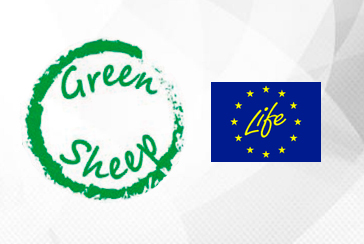Demonstration and dissemination actions to reduce the carbon footprint of European sheep farming

- Date: 01/10/2020 – 30/09-2025
- Project Manager at NEIKER: Roberto Ruiz Santos
- Budget: The total cost of the project amounts to 4.6 million euros, of which the European Union is contributing 2.5 million. NEIKER’s share is 222,859 €, of which 22,570 € will be covered by the EU.
- Partners: Lurgintza, ITACyL, Oviaragon (Spain); IDELE (France); Teagasc (Ireland); AGRIS, Univ. of Sassari, Laore (Italy); IBNA (Romania)
- Web: Green Sheep project
Sheep and goat farming contributes to greenhouse gas (GHG) emissions (methane, nitrous oxide, carbon dioxide) at a rate that, according to different sources, represents around 7.4% (FAO, 2017) of global GHG emissions. However, it is important to note that the behaviour of methane from ruminants in the atmosphere is not as important for climate change as CO2 from burning fossil fuels. In any case, as in all other human activities, it is necessary to generalise the use of management practices in the livestock sector that contribute to reducing GHG emissions and carbon sequestration.
According to estimates to date, the carbon footprint of sheep meat and milk production is more than double per kg of product compared to cattle (Battalla et al., 2015).
On the other hand, sheep can help regulate climate through carbon storage in grassland soils, as their management is largely based on grazing. These roles give sheep farming an important role in combating climate change, preventing fires, and maintaining human activity in disadvantaged areas.
The LIFE GREEN SHEEP project therefore seeks to promote low-carbon sheep farming systems and management practices that contribute to improving the sustainability of flocks. In this way, the aim is to improve the interactions between climate change and livestock farming, and to contribute to a more balanced territorial development. To this end, specific action plans will be developed for a large number of flocks in the participating countries (Spain, France, Ireland, Italy and Romania) with the specific objective of reducing the carbon footprint of sheep meat and milk production by 12%, while seeking to improve the sustainability of the flocks from a social, economic and environmental point of view.


